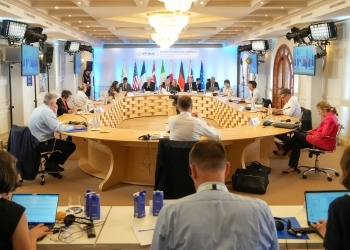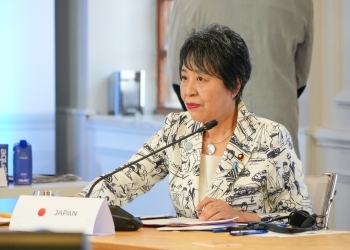G7
G7 Trade Ministers’ Meeting
“Trade and Environmental Sustainability” (Session 2) and “Economic Resilience and Economic Security” (Working Lunch)
July 17, 2024


On July 17, commencing at around 12:20pm for approximately 50 minutes, and commencing at around 1:40p.m. for approximately 40 minutes, Ms. KAMIKAWA Yoko, Minister for Foreign Affairs of Japan, participated in the “Trade and Environmental Sustainability” Session (Session 2) and the “Economic Resilience and Economic Security” Working Lunch of the G7 Trade Ministers’ Meeting, respectively. The overview of the meetings is as follows.
- “Trade and Environmental Sustainability” (Session 2)
- At the outset, H.E. Mr. Mathias Cormann, Secretary-General of the Organisation for Economic Co-operation and Development (OECD) thoroughly explained OECD’s efforts concerning trade and environmental sustainability.
- Minister Kamikawa pointed out that the G7 Trade Ministers must take the leading role to make trade policies and environmental sustainability mutually supportive as the world is witnessing severe natural disasters at an unprecedented pace. In addition, Minister Kamikawa stressed the importance to enhance inclusivity in trade, in particular promotion of women’s participation in trade, and introduced Japan’s efforts in supporting women’s employment and entrepreneurship in various countries and regions, including Africa and Ukraine, and stated that Japan will continue these efforts.
- G7 Trade Ministers affirmed that climate change and environmental sustainability is the top and urgent priority for the international community, and confirmed that the Trade Ministers’ Track will continue to discuss sustainability as well as inclusivity and further enhance the cooperation.
- Economic Resilience and Economic Security” (Working Lunch)
- From the perspective of trade, Minister Kamikawa pointed out the importance of efforts to properly respond to non-market policies and practices (NMPP) resulting in overcapacities for the objective of restoring a level playing field. In light of addressing economic coercion, Minister Kamikawa also stressed the importance of enhancing our capacity to counter, including the strengthening of supply chain resilience for critical minerals, and the importance of collaboration beyond the G7. Minister Kamikawa further pointed out the importance of unity among like-minded countries in not allowing arbitrary export controls, and the importance of collaboration between the public and private sectors to mitigate the impact of such controls.
- The Ministers engaged in active discussions and concurred to strengthen collaboration among like-minded countries and between the public and private sectors for enhancing supply chain resilience. They also confirmed their acknowledgement that market distortion and overcapacity resulting from NMPP not only undermine the international economic order but also hinder emerging and developing countries’ sustainable development and concurred on the importance of implementing the Leaders’ commitment at the G7 Apulia Summit. In addition, the Ministers confirmed to strengthen monitoring and information exchange on export controls of critical minerals and promote high environmental, social, and governance (ESG) standards in the mining, processing, and investments of critical minerals. They condemned any attempts to weaponize economic dependencies and concurred to increase collective assessment, preparedness, deterrence, and response to economic coercion.

